Interior minister apologises over Tbilisi nightclub raids as far-right groups plan daily protests

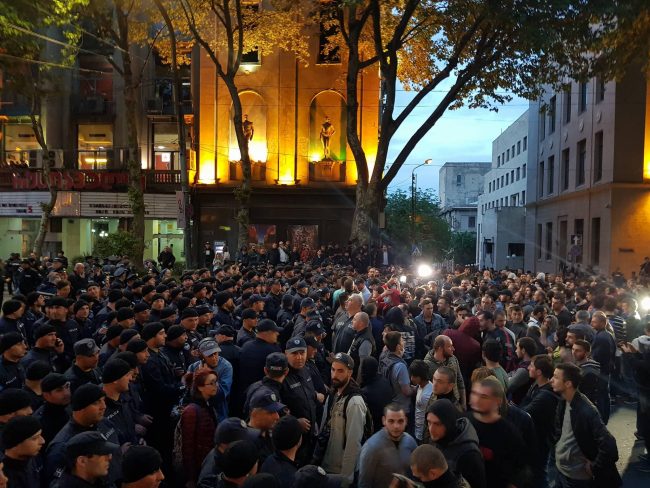
 Georgia’s Interior Minister Giorgi Gakharia has apologised over police raids on two popular nightclubs in Tbilisi. Gakharia met with protest leaders during a rally in front of Tbilisi’s parliament building on Sunday evening. Far-right groups, who have been holding counter-demonstrations against ‘drug dealers and LGBT propagandists’ vowed to continue to protest.
Georgia’s Interior Minister Giorgi Gakharia has apologised over police raids on two popular nightclubs in Tbilisi. Gakharia met with protest leaders during a rally in front of Tbilisi’s parliament building on Sunday evening. Far-right groups, who have been holding counter-demonstrations against ‘drug dealers and LGBT propagandists’ vowed to continue to protest.
Thousands of protesters had been demanding Gakharia and Prime Minister Giorgi Kvirikashvili resign following the raids on the Bassiani and Café Gallery nightclubs in the early hours of Saturday. The purpose of the raids, purportedly to detain drug dealers in the clubs, came into question after Public Defender Nino Lomjaria revealed that the eight suspects arrested were done so outside of the clubs and before the raids took place.
Chaos erupted after police forcefully dispersed a spontaneous rally in front of Bassiani immediately after the raids. Police used force against protesters and several journalists were reported injured during the brawl.
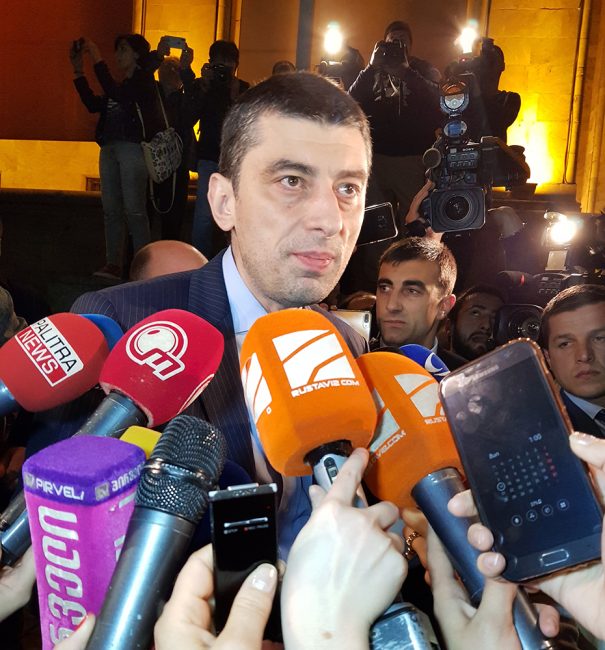
‘I apologise to you in the name of those employees of the ministry if any of them violated your rights’, Gakharia told protesters. Gakharia also promised the ministry would achieve ‘concrete results’ in drug policy reform, a key demand of protesters.
Gakharia asked the rally to disperse and said that the safety of citizens was a priority regardless of their ‘[sexual] orientation, religious beliefs, or age’.
One of the protest leaders, Beka Tsikarishvili from drug liberalisation group the White Noise Movement, announced a pause in demonstrations until 19 May to ‘monitor progress’, but vowed protests would continue if their demands were not met.
Protest leaders met with representatives of the Ministry of Internal Affairs, as well as the Public Defender, Monday morning to ‘discuss every minute’ of the raids. More meetings are planned in the next week. The Public Defender said that the ministry is prepared to hand over footage of the raids as well as the arrests of suspects.
The Ministry of Internal Affairs has yet to address the Public Defender’s claims the arrests were made prior to the raids.
[Read more on OC Media: Public Defender: alleged drug dealers arrested before Tbilisi nightclub raids]
Speaker of Parliament Irakli Kobakhidze said on Monday that the government was developing a new draft law on drug policy ‘to be ready within the next two weeks’ with the aim to adopt the new law by the end of June.
Demonstration proceeds in front of the Georgian Parliament where protesters dance to electronic music after yesterday’s raid on nightclubs #Bassiani #tbilisi pic.twitter.com/mgBAQhOatf
— OC Media (@OCMediaorg) May 12, 2018
Protesters played electronic music at the demonstration on Saturday against a police raid of nightclubs in Tbilisi. (Dato Parulava /OC Media)
Far-right protests
Thousands gathered outside parliament on Saturday and Sunday in the wake of the raids, protesting what they termed excessive force by police. On Sunday, protesters had to be escorted from the site by police after a far-right counter-rally nearby turned violent.
The counter-rally, organised by a number of conservative and far-right groups, attempted to break through police lines and reach the main rally multiple times without success. Members of the counter-rally repeatedly threatened to use violence against participants of the main rally, accusing them of spreading ‘drug and LGBT propaganda’.
Neo-Nazi group the National Unity of Georgia threatened to form ‘blackshirt detachments’ ‘against drug dealers and LGBT propagandists’, and chanted ‘death to the enemy’ giving Nazi salutes.
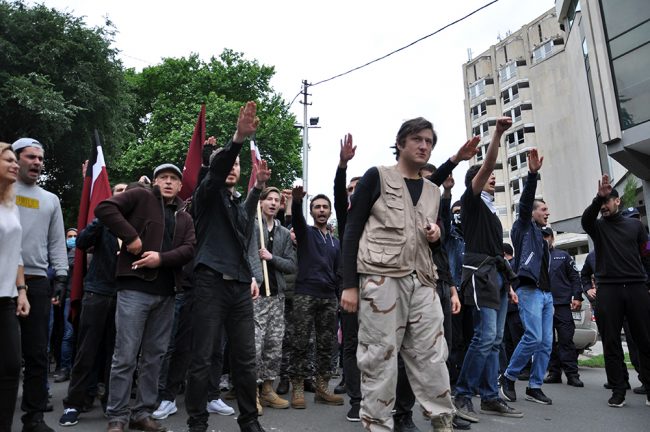
Far-right counter-rally gathered near 9 April Square after being prevented by police from going to the parliament where #Bassiani #CafeGallery protest is being held #Tbilisi pic.twitter.com/AQylLaTIts
— OC Media (@OCMediaorg) May 13, 2018
Far-right groups chanting ‘death to the enemy’. (Mari Nikuradze /OC Media)
Far right mob is trying to break the police line again. Policemen don’t let them through despite anti-violence protesters have already left #Bassiani #Tbilisi pic.twitter.com/lGbSujYDMV
— OC Media (@OCMediaorg) May 13, 2018
Far-right groups repeatedly tried to break through police lines, even after the main rally dispersed. (Dato Parulava /OC Media)
The far-right counter-rally refused to disperse after the main rally was escorted away from the parliament building and Interior Minister Giorgi Gakharia and Tbilisi Mayor Kakha Kaladze were booed as they approached the crowd to attempt to negotiate with them.
Sandro Bregadze, leader of the conservative, ultranationalist group the March of Georgians, announced that the group would hold rallies every day ‘with candles and prayers’ until 17 May — International Day Against Homophobia, Transphobia, and Biphobia. The date was declared Day of Family Purity by the Georgian Orthodox Church in 2014, a year after a mob led by priests attacked a handful of queer rights protesters.
Other far-right groups announced their own rallies, including the Society for Protection of Children’s Rights, an anti-abortion and anti-queer NGO that had demanded the closure of Bassiani recent reports of drug overdose deaths.
[Read OC Media’s profile on Georgian far-right following July 2017 rally: Who was in and who was out in Tbilisi’s far-right March of Georgians]
‘On the brink of civil conflict’
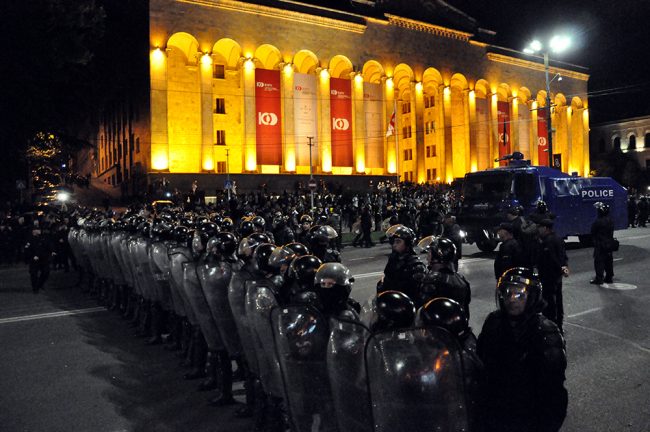
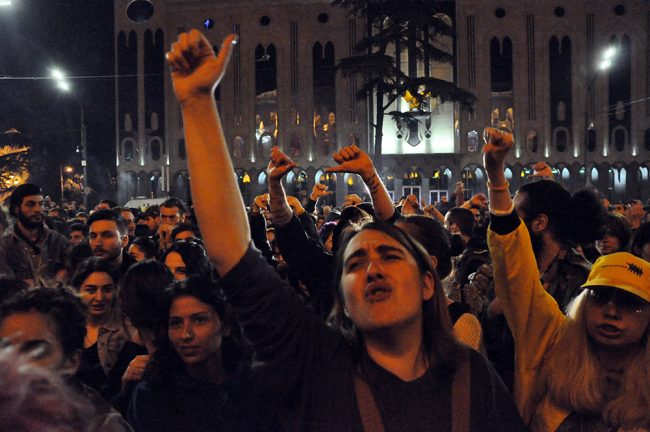
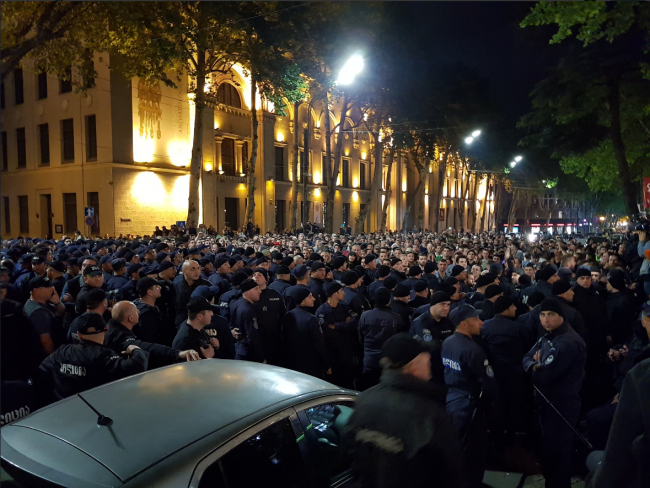
Prime Minister Giorgi Kvirikashvili said on Sunday evening that the government would pursue a hardline policy against drug dealers and a soft policy against drug consumers, and reiterated the protesters’ right to freedom of expression. He called on the police to do everything in their power to avoid a confrontation between the two groups.
As the two rallies were underway, the Georgian Orthodox Church called on protesters to disperse in order to avoid a further escalation of the situation but blamed the situation on the main rally. ‘The statements and behaviour of some of the youth gathered in front of the [parliament building] gave grounds for a counter-demonstration’, the statement said. The Patriarchate also stated that they were ready to ‘join in the dialogue and discuss all issues’.
President Giorgi Margvelashvili lambasted the government’s ‘total failure’, accusing them of making ‘a series of mistakes’ which had brought the country to the ‘brink of civil conflict’. Margvelashvili also offered to launch an ‘anti-drugs campaign’, suggesting it should be led by club-goers and those ‘who speak a language accessible to young people’. Margvelashvili said that drug policy should be ‘liberal’ in Georgia, focusing on fighting ‘drug dealers instead of drug users’.
[Read more on OC Media: Government pushes back at policy reform as drugs claim at least 4 lives in Georgia]
The raids came hours after former Prime Minister, billionaire Bidzina Ivanishvili was appointed leader of the ruling Georgian Dream Party. His return to frontline politics followed reports of intra-party tensions and continued allegations of Ivanishvili’s informal rule after his resignation and official retirement from politics in late 2013.
Professor Tornike Sharashenidze from the Georgian Institute of Public Affairs told OC Media that the main reason behind Ivanishvili’s return to politics was ‘a mess’ within Georgian Dream as well as his will to unseat Prime Minister Giorgi Kvirikashvili, whom he ‘doesn’t seem to like much’.
Former Georgian Dream Energy Minister and current Tbilisi Mayor Kakha Kaladze had been a vocal proponent of developing club culture in Tbilisi, making it one of the pillars of his election campaign in the autumn of 2017.
Bassiani and Café Gallery, as well as several other nightclubs in Tbilisi, have become a popular meeting spot among queer people in Georgia, and have long been associated with liberalism by the far-right. Bassiani earned international fame for its parties, including closed queer events, and has been hailed by a number of international media outlets as being at the forefront of Europe’s club scene.
Drug liberalisation
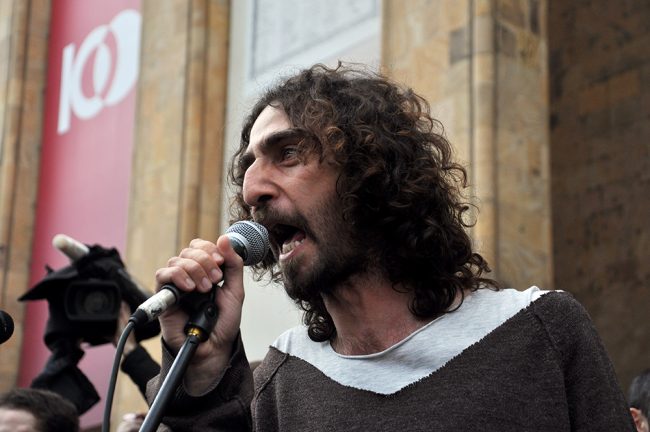
The raids follow recent controversy over drug policy liberalisation in the country after at least four people died from the use of an unknown drug. The deaths have intensified calls from some quarters for Bassiani, an alleged drug trafficking hot-spot, to be shut down. Bassiani rejected the allegations on 7 May and wrote that the Georgian club scene was being targeted and discredited by ‘regressive’ and ‘pro-Russia forces’.
[Read more on OC Media: Government pushes back at policy reform as drugs claim at least 4 lives in Georgia]
Georgia has one of the strictest drug policies in Europe, with every third prisoner serving their time for drug-related offences. Of the 207 illegal drugs in Georgia, the law does not differentiate quantities for 147, meaning possession of even the tiniest amount could lead to 8–20 years or life imprisonment for certain substances. The availability of treatment is also limited.
[Read more on Georgia’s drug policy OC Media: Georgia’s ‘war against the people’ and the war against a ‘system that stinks’]
Several large rallies have been held in Georgia in recent years calling for a more liberal drug policy. In May 2013, then 27-year-old Beka Tsikarishvili, one of the current protest’s leaders, was arrested for the possession of 69 grammes of cannabis. The ‘Beka is not a criminal’ campaign was supported by thousands in a series of street protests.
In 2015, the Constitutional Court issued an unprecedented ruling on Tsikarishvili’s case, ruling against Parliament that purchase and storing of up to 69 grammes of dry cannabis should no longer be considered an imprisonable offence. He was finally fined ₾2,000 ($820) in August 2017.
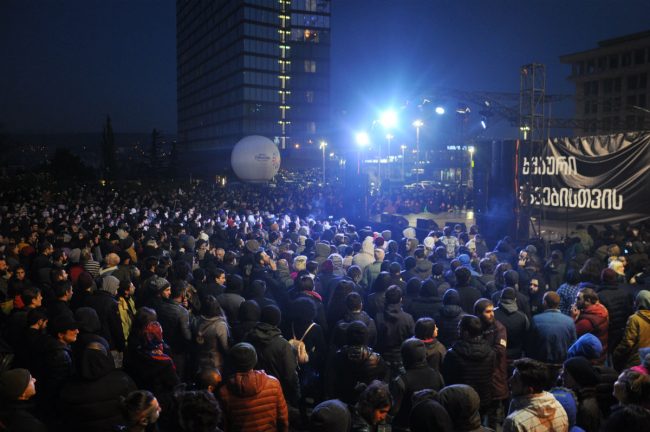
A December 2017 protest demanded the urgent adoption of new legislation that had been submitted to parliament in June. The core principle of the changes would be to move the country’s drug policy away from a criminal justice approach, treating drug use instead as a public health issue.
According to the authors of the bill, Tbilisi-based advocacy group the National Drug Policy Platform, which consists of over 40 NGOs, current drug policy concentrates on punishing drug-addicts, instead of treating them. If the bill is adopted, distribution and trafficking of drugs would still be treated as a criminal offence, with possession of small quantities of all drugs for personal use decriminalised.
The bill was put on hold in March as an interagency commission expressed support for a new government draft drug policy law which doesn’t include decriminalisation. The new bill has faced backlash from activists and rights groups as not going far enough to address the core issues.
On 8 May, parliament’s Committee on Healthcare and Social Issues postponed the hearing of the draft law for a third time. The leader of the parliamentary majority Archil Talakvadze reiterated Georgian Dream’s support for the policy changes that would focus on prevention, but also called for ‘greater support for law enforcement agencies in their fight against organised drug crime’.
Speaking with journalists later that day, Health Minister Davit Sergeenko dismissed the idea of ‘drug liberalisation’ and advocated for a strategy in favour of the ‘reduction of supply and usage’ of drugs.







